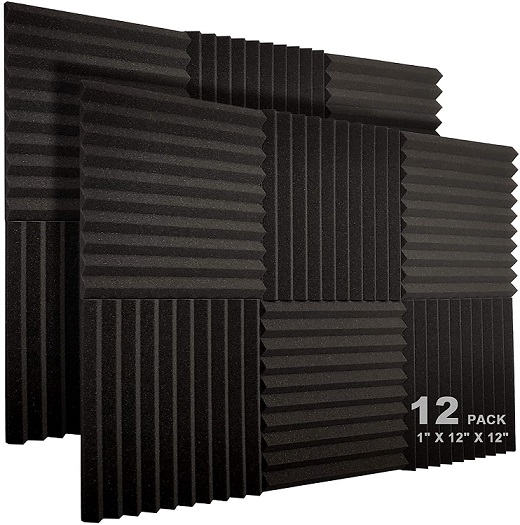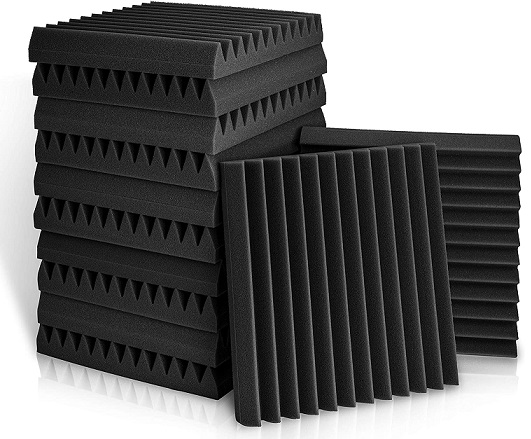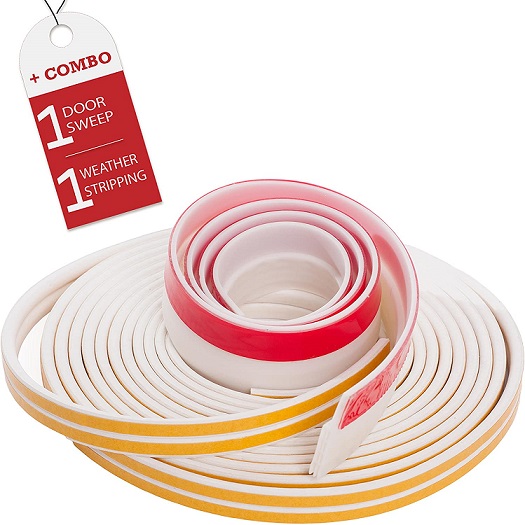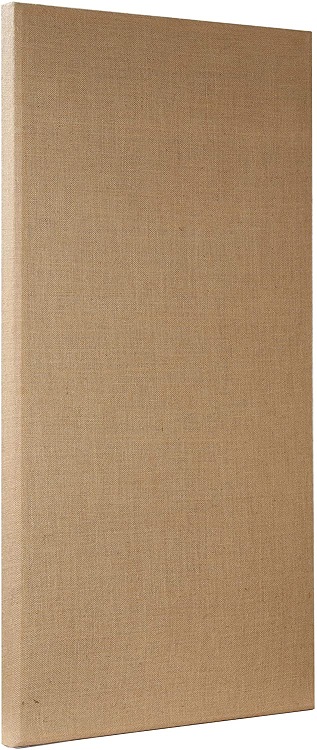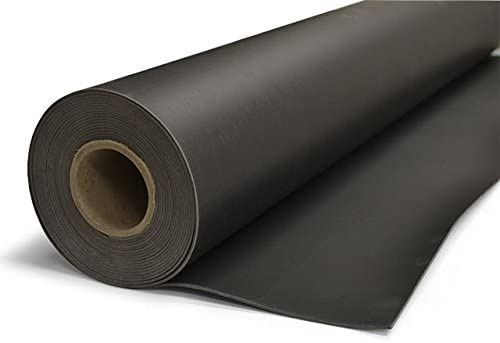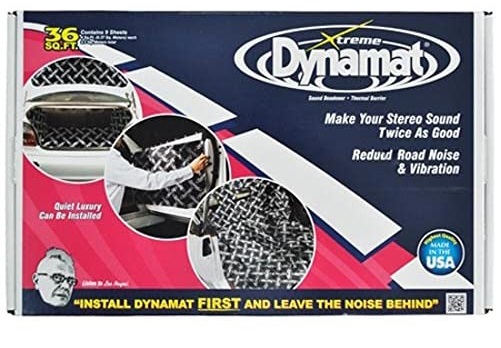Soundproofing is essential for creating a peaceful environment free from unwanted noise. In this guide, we’ll explore “Various Soundproofing Materials” available on the market. From foam panels to fiberglass insulation, we’ll delve into their effectiveness, cost-efficiency, and ease of installation. Whether you’re dealing with noisy neighbors or aiming to enhance your recording studio, understanding these soundproofing options is crucial.
Outline
ToggleBest Soundproof Materials
| Best Soundproof Materials | Material | Use | Buy Now |
|---|---|---|---|
| JBER Soundproofing Materials | Polyurethane | Spot treating sound. Studio, office, home | Check On Amazon |
| Fstop Labs Soundproof Materials | Foam Panels | Studio, home, office, commercial use | Check On Amazon |
| DMSKY Soundproof Material | Polyester | Studios, home studios, home theaters, home offices. | Check On Amazon |
| NICETOWN Soundproof Material | Polyester, Polyester Blend | Home, office. | Check On Amazon |
| Roberts Soundproof Material | Fibrous | Home, office. | Check On Amazon |
| Kanzzy Soundproof Materials | Silicon | Soundproof door, Wind, Dust, Draft & Insect Proof – Insulation | Check On Amazon |
| ATS Soundproof Materials | Wood | Studio, home, office, commercial use | Check On Amazon |
| Trademark Soundproof Materials | Vinyl | Soundproof coating for wall. cars, ceiling, machinery | Check On Amazon |
| Dynamat Sound Materials | Tar Bi- product | Soundproof cars | Check On Amazon |
Best Soundproof Materials Reviews
1. JBER Soundproofing Materials
Acoustic foam panels are a great choice for spot-treating a small room or studio. JBER is probably the best soundproof solution for residential use because they are simple, efficient, and super easy to use. They are also reasonably priced means you can consider them if you need to spot-treat a larger space.
Each tile measures exactly 1 square foot and is made of 1-inch thick acoustic foam. These are best known as studio foams because they instantly improve the audio quality for voice and video recording. It’s an effective noise deadener that flutters echoes and reduces background noise. Hence, they are also a good choice for keeping things quiet in crowded places like gyms, schools, and offices.
They have this distinctive pyramidal shape that traps sound reflections, and reverberations and absorbs unwanted noise. The foam material is dense, and firm, and the sound absorption is consistent. They are available in three different colors. You can easily cut them into size if you wish. It will not affect its performance. The only downside is that they are a little on the pricier side.
Best Features:
- Polyurethane acoustic panels
- Noise deadener
- Controls echo sound, reverb, and unwanted noise
- Measures 12x 12 inches each
- 1 inch in thickness
- Can be cut into the desired size
Pros:
- Easy to use
- Affordable
- Effective noise reduction
Cons:
- Acoustic wedges don’t make a room soundproof. They are only good at reducing sound reflections, flutter, and echo.
2. Fstop Labs Soundproof Materials
Next, we have another acoustic panel that does an excellent job of fluttering echoes and reducing background noise. These wedges have a surface area of 12×12 inches are and about 2 inches thick. These are ideal for spot treatments on walls of small studios.
These are made of polyurethane and the material is twice as thicker as the other acoustic foam that we reviewed, hence a little more expensive. It’s ideal for spot-treating small studios, practice rooms, and home entertainment centers. It controls echoes, reverberation, and other by-products of sounds that can spoil the audio experience.
They have used high-density polyurethane which increases the sound clarity at a spot thereby you can enjoy the audio experience. They are available in packs of 12 and 24 and 7 different colors. You can easily cut them into size if you wish. It will not affect its performance. The only downside is that they are a little on the pricier side.
Best Features:
- Polyurethane acoustic panels
- Noise deadener
- Controls echo sound, reverb, and unwanted noise
- Each wedge measures 12x 12 inches
- 2 inches in thickness
- Can be cut into the desired size
Pros:
- Good at spot treatment
- Controls echoes, reverberation, and other by-products of sounds
- Easy soundproof solution
Cons:
- Expensive
3. DMSKY Soundproof Material
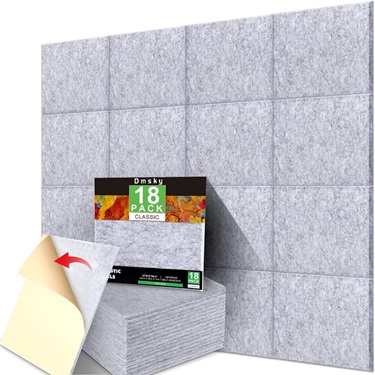
Transform your environment with these soundproof wall panels designed to not only diminish noise but also enhance the aesthetic quality of the area. Designed for simplicity, our panels come with a self-adhesive backing, eliminating the need for specialized tools or extra materials during installation. Just remove the protective film and effortlessly attach the panels to walls, doors, or ceilings.
The 45° Chamferin beveled edge design ensures a seamless fit, effectively preventing sound leakage. Versatile and adaptable, these panels are suitable for a variety of settings such as studios, offices, and home theaters, providing professional-grade sound absorption without compromising on style or functionality.
Best Features:
- High-density polyester fiber for superior sound absorption
- Self-adhesive design for effortless installation
- Multi-color options for customizable décor
- Versatile applications in studios, offices, and home theaters
- Professional sound-absorbing properties
- Safe, eco-friendly, and odorless material
Pros:
- Easy to install
- Effective noise reduction
- Durable construction
- Aesthetic enhancement for any space
Cons:
- Adhesion may vary
4. NICETOWN Soundproof Material
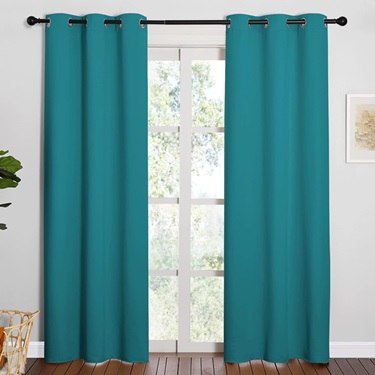
Their seamless combination of modern style and practicality makes them essential for homes seeking both trendy décor and effective solutions. Designed for superior performance, these curtains block between 85% to 99% of light and UV rays, making them ideal for bedrooms, playrooms, or any space requiring precise light control.
In addition to reducing screen glare for a better viewing experience, they contribute significantly to energy conservation by regulating room temperature, and ensuring comfort throughout the year. Furthermore, their low-maintenance fabric ensures long-lasting durability, making them a wise investment for homeowners who value quality.
Best Features:
- Superior light blocking for optimal darkness
- Innovative triple weave technology for energy efficiency
- Quality fabric without liner for a soft, heavy feel
- Easy installation with 6 grommets top each panel
- Machine washable for effortless maintenance
- Modern design to complement any décor
Pros:
- Exceptional light blocking
- Energy-saving properties
- Soft and heavy fabric
- Easy to install and maintain
Cons:
- Appearance may not suit all preferences
5. Roberts Soundproof Material
To reduce sound transmission on hardwood and laminate floors the best thing you can do is use floor underlayments. The Roberts Super Felt floor underlayment is one of the best choices for a floor that makes too much noise.
It is made from recycled fibers that are compressed into a solid mat using high temperatures to make a material that can absorb noise. It’s 3 mm thick which reduces sound transmission from upper floors to lower floors, and also helps in providing insulation.
It’s a 36 feet square roll with adhesive strips on one side. It’s super easy to install. Simply peel the sticker and lay it on the wooden or laminate floor, and you’re done. Lastly, the floor underlayment can protect your hard floor from moisture and vapor. So you don’t have to worry about damaging your floor.
All in all, the Robert Super Felt is a great solution for noise-proofing a floor, increasing comfort and longevity.
Best Features:
- Absorbs noise and reduce sound transmission
- 360 sq feet floor underlayment
- 3 mm in thickness
- STC rating 66
- IIC rating 67
- Provides cushion comfort over hardwood floors
- Protects laminate floor from moisture and humidity
Pros:
- Easy stick-on floor underlayment
- Excellent choice for soundproofing wooden and laminate floors
- Affordable
Cons:
- The fibers can cause an issue for asthmatic patients. Avoid keeping in close contact.
6. Kanzzy Soundproof Materials
Most of the unwanted noise sneaks in through the door jam and the door sweep. Soundproof rubber gaskets or foam gaskets like this one can help seal the gaps in between while preventing the outside noise from entering your house.
Unlike most of the compressive gaskets, which are 39-inch sweep and can only cover the sides, the gasket from Kanzzy will seal it 360 degrees, leaving no gaps in between. It’s incredibly easy to use and will fit all 4 types of house doors. It’s made of silicone, and it’s self-adhesive.
All you need to do is remove the peel and stick it onto the gaps. It’s strong enough to firmly stick to the place, but it can be removed if needed without causing any damage to the door. The compressive gasket is enough to stick. It’s the cheapest soundproof solution if you are looking for that. These are also called weather stripping door tapes as it also helps in insulation. It seals the heat inside in winter and the air conditioner in summer.
Best Features:
- The 43-inch strip covers all 4 sides
- Blocks noise
- Air-tight weatherstripping kit
- Made of silicone
- Peel and stick
- Provides room insulation
Pros:
- Simplest soundproof solution
- Best for sealing door gaps that let in unwanted noise
- Affordable
- Provides insulation too
Cons:
- The door sweep is for gaps that are bigger than 1 inch
7. ATS Soundproof Materials
Don’t know how acoustic wedges look like in a room? Well, you can try acoustic panels. These wooden frame panels are the best choices for rooms and studios where an acoustic widget doesn’t look aesthetically pleasing. They are great at absorbing reverberation and echo and work best for mid to high-range noise. At a glance, they look like a large picture frame rather than a sound-deadening panel.
The ATS acoustic panels are constructed with mineral wool and a solid wooden frame. On top of that, there is a 100% natural jute covering to make it look even more appealing. It reduces reflection from hard surfaces inside a room. Each acoustic panel has an NRC ( Noise reduction coefficient) rating between 0 and 1. It’s one of the best sound-absorbing materials for budget studio set-ups.
Each of these panels measures 24x48x2 inches and 2 inches are sold as single pieces. It even comes with wall mounting hardware and an installation manual. They can be used as free-standing, wall-mountable, or suspended from the ceiling for multidimensional noise control.
Best Features:
- Controls reverb and echo
- NRC rating 0 to 1
- Come in single pieces
- Diameters 24x48x2
- Made of mineral wool covered in jute
- Made in USA
Pros:
- Great for studios, living rooms and auditoriums
- Budget-friendly
- Have an aesthetic appeal
Cons:
- No size and color options
8. Trademark Soundproof Materials
Those looking for professional-grade soundproofing can try out these soundproof pads from TMS. These are solid mass-loaded vinyl sheets with an STC rating of 27. They are ⅛ inch thick and weigh almost 1 pound per square foot, which builds a highly potent noise barrier.
It’s a professional-grade wall padding and a noise dampener that works for a wide variety of noises. Whether it’s for residential applications, studio projects, or a machinery enclosure, the TMS soundproof wall padding comes with the smartest soundproof solutions.
It’s affordable, comparatively easy to use, and comes with a wide range of applications. The TMS soundproofing material does not contain any harmful chemicals. All in all, it’s a great deal for the price you pay. And the best for studios, apartments, and audio rooms.
Best Features:
- ⅛ inch thick vinyl sheets. Weighs 1 pound per square foot.
- Perfect soundproofing solution for residential use as well as professional use
- Comes in three different sizes- 16 sq ft, 40 sq ft and 100 sq ft.
- It’s made in the USA.
Pros:
- Thick vinyl sheets provide effective noise-deadening
- Affordable
- Easy to install
Cons:
- Cannot stop low bass
- Odor issues
9. Dynamat Soundproof Materials
When it’s about car soundproofing, we suggest you buy nothing other than Dynamat. It’s surely one of the most popular brands for selling sound-deadening mats for automobiles. Dynamat Xtreme comes in a bulk pack with a total of 9 sheets which you can use in various parts of the car door, floor, trunk, etc.
It features an aluminum front and butyl-back which greatly reduces noise and vibrations inside a car. Since. It’s aluminum it also reflects heat keeping your car cool. And the butyl material at the back keeps it odorless. It’s pretty easy to put as well. It needs to be installed directly on the metal portion of the car. It goes completely undetectable as the car rim is put back in place.
Each of the sheets measures 18×32 inches in size, and there is a total of 9 sheets that you will receive. Dynamat also has launched deadening kits for car speaker boxes, decks, and cabins that you can buy separately. You will also find that Dynamt’s original version sounds deadened, which is much cheaper than Dynamat’s. But comparing the two Dynamat Xtreme is lighter means it’s easier to install and is 4 times more effective at sound deadening as claimed by the brand.
Best Features:
- Bulk package with a total of 9 sheets
- Each of the sheets measures 18×32-inch and is 1.12 mm thick
- Can be used on the car floor, doors, deck, trunk, and boot.
- The sheets are black anodized finished
- It has an aluminum front and butyl rubber back
- Odorless and reflects heat
Pros:
- Great at sound, and vibration reduction
- Easy to install
- Lightweight
- Most trusted brand
Cons:
- High priced
Types of Soundproof Materials
Creating environments that promote calmness and efficiency relies heavily on effective soundproofing, whether it’s in homes, offices, or creative studios. Various soundproof materials are available to effectively reduce or absorb undesirable noise, each with its own unique features and applications. This section will explore the different types of soundproof materials and evaluate their suitability for various needs.
1. Acoustic Panels
Acoustic panels are commonly employed for sound insulation due to their effectiveness and versatility in various settings. Typically composed of materials such as foam, fabric, or fiberglass, they are designed to absorb sound waves, diminishing echoes and reverberations. Available in a range of sizes and configurations, they can be tailored to suit different environments and acoustic requirements. These panels are frequently utilized in locations such as recording studios, home theaters, offices, and restaurants to enhance sound quality and minimize noise disturbances.
2. Soundproof Curtains
Soundproof curtains, also known as blackout curtains, provide an efficient remedy for reducing noise transfer. Crafted from dense materials, these curtains effectively hinder incoming sound waves and provide insulation against external noise. They are easy to set up and suitable for application in diverse settings like bedrooms, living rooms, or any area requiring noise reduction. Particularly beneficial in minimizing street noise, disturbances from neighbors, or unwanted sounds from nearby spaces, soundproof curtains offer a practical solution.
3. Insulation Materials
Insulation materials play a crucial role in soundproofing by preventing sound transmission through walls, floors, and ceilings. Common materials like fiberglass, mineral wool, and foam boards are utilized for this purpose, being positioned between walls or within ceiling gaps to minimize sound transfer. Effective insulation not only diminishes airborne noise but also improves thermal insulation, addressing both soundproofing and energy efficiency requirements.
4. Soundproofing Foam
Sound-dampening foam, commonly known as acoustic foam, functions to absorb sound waves and reduce reverberation within a space. Made from lightweight, porous foam, it captures sound energy in transit, resulting in reduced noise levels. This versatile material comes in various forms such as panels, tiles, and bass traps, making it suitable for diverse environments. Its applications range from recording studios and home theaters to office spaces, aiding in the creation of acoustically balanced surroundings.
Factors to Consider When Choosing Soundproof Materials
Selecting the appropriate sound-dampening materials is crucial in diminishing noise levels and fostering a more serene atmosphere. Given the multitude of choices available, pinpointing the optimal ones can pose a difficulty. To ensure you make a suitable selection tailored to your needs, take into account these key considerations.
1. Room Size and Layout
The dimensions and configuration of the space play a crucial role in determining the type and quantity of soundproofing material required. Larger rooms typically necessitate a greater amount of material for effective sound insulation, whereas smaller spaces may only require targeted treatments. Additionally, factors such as the presence of windows, doors, and furniture can influence the propagation and absorption of sound, thus necessitating careful consideration when selecting soundproofing materials.
2. Noise Source and Frequency
Identifying the source and type of noise is crucial prior to selecting appropriate soundproofing materials. Various materials are effective against different types of noise, such as exterior loud sounds or indoor echoes. For example, soundproofing curtains can mitigate external noise, while acoustic panels excel at dampening indoor reverberations. Understanding the nature of the noise aids in selecting the most suitable solution for maintaining a quiet environment.
3. Budget and Cost-Effectiveness
Soundproofing endeavors can vary in expense contingent upon the necessary materials and associated installation or labor charges. Establishing a budget and prioritizing materials that offer optimal value is prudent. Although premium materials may offer superior performance, there are more economical alternatives that remain effective. It’s essential to weigh the initial costs against the durability of the materials to determine the most suitable option for your needs.
4. Aesthetic Preferences
Various varieties of soundproofing materials come in a range of styles, colors, and finishes to cater to diverse tastes in interior design. Whether you prefer understated and minimalist solutions or bold and ornamental selections, there are soundproofing choices suitable for your environment. Considering how these materials harmonize with the existing décor and ambiance of the room is crucial for achieving a cohesive and visually appealing result.
Soundproof Materials – FAQs
Ans: While soundproof materials can significantly reduce noise levels, complete elimination of noise may not always be achievable.
Ans: Common types of soundproof materials include acoustic panels, soundproof curtains, insulation materials, and soundproofing foam.
Ans: Some soundproof materials are made from eco-friendly and recyclable materials, offering sustainable solutions for noise reduction.
Ans: Some soundproof materials are designed to be fire-resistant or meet specific fire safety standards for added protection.
Ans: Absolutely, soundproof materials are commonly used in offices, restaurants, hotels, and other commercial establishments to create quieter and more comfortable environments.
Conclusion
Selecting appropriate soundproofing materials requires taking into account various elements such as the dimensions of the space, sources of noise, financial constraints, and aesthetic preferences. Familiarizing oneself with the characteristics of different options aids in reducing unwanted sounds and promoting a peaceful environment. Whether opting for acoustic panels, draperies, insulation, or foam, making the correct choices enhances both comfort and the acoustics of the area. This is advantageous for homeowners, enterprises, and individuals in professions where effective noise management is crucial.

